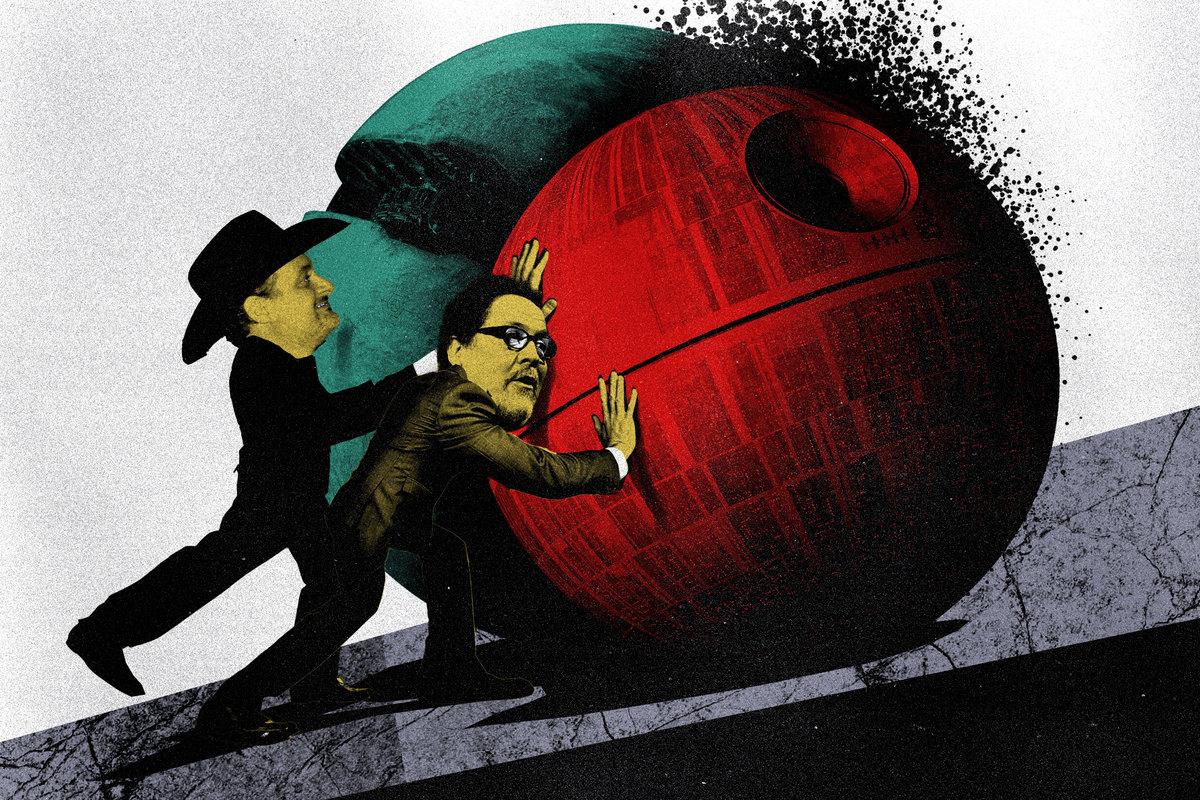The Mandoverse Needs a Writers Room
Dave Filoni and Jon Favreau deserve plenty of praise as the primary architects of ‘Star Wars’ TV. As their responsibilities grow and the show quality dips with inconsistent seasons of ‘Ahsoka,’ ‘The Mandalorian,’ and ‘The Book of Boba Fett,’ however, it’s time for them to share the script load.
In the Season 3 premiere of The Clone Wars, directed by Dave Filoni, an underperforming quintet of clone squadmates risks relegation to maintenance duty. In combat training, these clones can’t cooperate. One particular clone, CT-782 (a.k.a. “Hevy”), has a counterproductive tendency to try to do everything himself—until he gets a talking-to from a noncombatant brother, 99, who reminds him of the value of functioning as a team and delegating responsibility.
“You’re always trying to be the anchor, Hevy—you know, do it on your own,” 99 says. “Well, maybe you should embrace the fact that you have a team. … You need them, and they need you. Why carry such a heavy burden on your own when you have your brothers at your side?”
Thus inspired to stop playing hero ball, Hevy learns to trust and rely on his comrades, and the group graduates. When 99 compliments Hevy’s leadership, the newly collaborative clone declines the label. “No leaders,” he says. “We are a team.”
Star Wars is associated with the hero’s journey, but most Star Wars stories are heroes’ journeys. Even Skywalkers can’t go it alone: As Luke derisively says to Rey in The Last Jedi, “You think what? I’m gonna walk out with a laser sword and face down the whole First Order?” (He ends up doing just that, but only long distance, to buy time for Rey to rescue Leia and the rest of the Resistance.) The Skywalker who uses the most “I” statements, Anakin, falls to the dark side, and both baddies and good guys who declare that they don’t need any help—“I have you now,” “I will deal with them myself,” “I feel like I could take on the whole Empire myself”—are typically in line for a comeuppance. Even the most gifted figures have to learn how to accept some assistance. “I think I can handle myself,” Rey protests when Han hands her a blaster in The Force Awakens. “I know you do,” Han answers. “That’s why I’m giving it to you.”
One fundamental lesson of Star Wars is that it takes an (Ewok) village to raise a rebellion or win a war. And when victory comes, there’s bound to be more than one person on the podium at the medal ceremony. Which makes it more glaring that at the end of some Star Wars series these days, there’s only one writing credit.
Filoni and Jon Favreau, the primary architects of Star Wars TV, deserve plenty of praise for keeping the franchise on its feet during its post-sequel-trilogy absence from theaters. They made The Mandalorian an instant sensation, giving Disney+ a killer launch title and establishing a firm foothold for Star Wars in live-action TV. They constructed an interconnected narrative unspooled across several series and at least one future film. They linked Filoni’s animated projects to live action, unifying eras of Star Wars TV even as they try to unify eras of in-universe story. But now they need a 99-style intervention, because they appear to be taking on too much creative responsibility themselves. Following inconsistent seasons of The Book of Boba Fett, The Mandalorian, and Ahsoka, it’s increasingly clear that it’s time for the F&F Boys to share the load a little. The Mandoverse requires a writers room.
Since Star Wars struck out into live action, Favreau and Filoni have always eschewed a traditional TV writers room, in which a group of writers team up to toss out ideas and break a story, then split up to focus on individual episode assignments (and sometimes reconvene to polish near-finished scripts). From the get-go, The Mandalorian was more of a two-man job, with Favreau as creator and Filoni as his lore-loving right-hand man. And for the first two seasons, that model mostly worked, yielding classic, character-driven Star Wars stories that garnered great ratings and critical acclaim.
In the past two years, the Mandoverse has expanded, and its growing pains have taken tolls on the most recent season of the flagship show and the inaugural (and thus far, sole) seasons of its first two spinoffs. The series have buckled a bit under the strain of supporting a shared story—which has contributed to unfulfilling finales, a glut of cameos and crossovers, and curious structural calls, like the decision to resolve much of The Mandalorian’s post-second-season suspense about the bond between Mando and Grogu in The Book of Boba Fett—but they’ve also slumped in dealing with dialogue, pacing, plausibility, and key character motivations.
Perhaps that’s unsurprising, considering Lucasfilm has upped its ambitions and episode orders without also expanding the roster of people scripting those episodes. If anything, the writing credits have become more concentrated in Favreau and Filoni’s hands. Each of The Mandalorian’s first two seasons featured two episodes Favreau wasn’t credited for writing or co-writing—one apiece by Filoni and Rick Famuyiwa (or, in Season 1, Filoni and Famuyiwa with Marvel veteran Chris Yost). In Season 3, Favreau was credited on every episode, with a couple of co-writes for Filoni and one for Noah Kloor, who worked for Favreau’s production company as a coordinator on The Lion King and The Chef Show before joining The Mandalorian’s first season as a writer’s assistant. Favreau also wrote every episode of The Book of Boba Fett, with one co-write for Filoni, though director Robert Rodriguez also split the showrunning duties. (Kloor was credited as a staff writer—the only staff writer listed on any Mandoverse series.) And Filoni wrote every episode of Ahsoka. From the sound of it, this series of solo acts could continue. “Yeah, I’ve written it already,” Favreau said in February of The Mandalorian’s fourth season (before both the writers strike and the mixed reception to Season 3 and Ahsoka).
This arrangement poses a couple of problems, one of which comes down to bandwidth. The Mandoverse is still largely the Favs and Filoni show, except it’s now three shows—four, as soon as Skeleton Crew debuts, seemingly sometime next year—encompassing six seasons and a movie, with an unknown number of additional seasons still to be produced. Skeleton Crew was created and written by Christopher Ford and Jon Watts (with additional writing by Myung Joh Wesner), which makes it the least Favreau/Filoni-influenced Mandoverse series so far, but Disney’s dynamic duo is still executive producing it, in addition to writing, showrunning, executive producing, and sometimes directing the other three series.
Then there are the other projects the two have tackled (or are wrangling right now). Filoni, who worked in animation until The Mandalorian (which means he’s had a lot to learn about live-action productions), is Lucasfilm’s executive creative director, a wide-ranging role. He created Resistance, which was still airing when The Mandalorian debuted. He wrote or co-wrote much of The Clone Wars Season 7, which came out in 2020. He created The Bad Batch, which came out in 2021 and has a third and final season slated for next year. He created and wrote five of the six episodes of Tales of the Jedi’s first season, which went live last year and is getting a sequel. (“I decided to do some more,” Filoni said about Tales Season 2.) He’s also presumably planning his film. Favreau, meanwhile, produced Prehistoric Planet and is producing and directing Jungle Book 2. Together, they also consult on other Star Wars projects, such as Obi-Wan Kenobi. Can you imagine how many meetings these two attend? Not to mention their participation in conventions, interviews, and documentaries. They have to be busy guys, and all that multitasking may come at a cost to their scripts.
Even if Favreau and Filoni had unlimited time to revise, they’d still be bound by their limitations as writers, which is true of anyone working alone or with one other simpatico partner. Neither is a brilliant wordsmith—The Mandalorian’s success was never really due to dazzling dialogue—so unless someone with a complementary toolkit comes in to do a punch-up, their scripts aren’t going to sing in that respect. Favreau and Filoni are idea people who understand and respect the source material, care about it as deeply as their audiences, and excel at translating their enthusiasm to the screen. That skill set is immensely valuable, and ideally suited to starting massive IP projects from scratch, as Filoni (and George Lucas!) did with modern Star Wars animation, Favreau did with Iron Man and the MCU, and the two did together with live-action, small-screen Star Wars.
They’re only so-so, it seems, at sustained, serialized, live-action storytelling on a line-by-line level, or even an episode-by-episode basis. Which would be fine, if they were paired with other writers who could serve as sounding boards and put their own stamps on the scripts, allowing Favreau and Filoni to focus on the big picture, the type of long-term planning the sequel films lacked, and the day-to-day chaos of creating TV (as most showrunners do).
That model has worked for Filoni before. In his days as Lucas’s protégé, Filoni served as supervising director of The Clone Wars and three of Rebels’ four seasons, but he didn’t write much of those shows. In the first six seasons of The Clone Wars, all of which aired or entered production before Disney swallowed Star Wars, Filoni received a single “written by” credit, which he shared with another writer on the Season 2 finale. On Rebels, he co-wrote the Season 2 finale and several episodes of seasons 3 and 4, and he also received sole writing credit on three episodes, all in those last two seasons. Granted, even though animated shows aren’t quite as complex to produce as live-action ones, The Clone Wars and Rebels comprised many more episodes per season than shows produced for Disney+, so it would have been difficult for Filoni to Sorkin those suckers and write every script himself. The point is, he didn’t try to, and those shows were better off for their more democratic contributions.
Prior to Ahsoka, Filoni had all of two solo live-action writing credits to his name, one of which was for the worst episode of The Mandalorian’s first two seasons. Maybe the first-time live-action showrunner could have gotten some of the gang from the Rebels writing staff back together, the way Ahsoka, Sabine, and Hera (belatedly) got back together to search for Ezra. Instead, he essentially said, “Leave them to me.” “I wrote them all,” he announced in April. “That was a lot of work. I just know the characters well, so I had to do it.”
Cue 99’s line about being the anchor. Filoni undoubtedly does know Ahsoka’s characters as well as or better than anyone else, and he has a unique connection to Ahsoka herself, but that doesn’t mean he had to write every word of the series himself. In fact, it arguably made it more important for him to have help from writers whose knowledge of those characters weren’t comprehensive and personal, the better to put themselves in the place of viewers who hadn’t seen every second of Filoni’s animated shows. The show’s flagging ratings suggest that Filoni may not have done enough to onboard live-action-only fans, possibly because the “curse of knowledge” makes it difficult for experts to assess what their less-expert audiences will find confusing.
Even for Clone Wars and Rebels devotees, though, the season was marked, and ultimately marred, by missing or clumsily explained backstories, foggy motivations, plot points that strained suspension of disbelief, and crucial conversations that either weren’t shown or never took place. And like The Book of Boba Fett and The Mandalorian Season 3 before it, Ahsoka’s scripts were weighed down with redundant exposition, (ma)clunky diction, and some syntax tortured enough that I doubt The Ringer’s copy desk would let it stand if I filed it. As I wrote in my recap of the penultimate episode of The Mandalorian’s third season:
I’ve puzzled over how much repetition has crept into this season’s scripts, but also, what’s with all the dialogue that sounds as if it got garbled by Google Translate? Pellaeon’s pronouncement that “Grand Admiral Thrawn’s reemergence will herald in the reemergence of our military”—why herald in?—is right down there with earlier lines like “I believe that pursuit of knowledge is the most noble thing someone can do,” “You have done the highest honor of the Creed,” and “I am humbly requesting the New Republic to send a patrol to clear out the raiders.” Somebody please proofread Favreau!
Those nitpicks are pedantic, maybe, but they seem like symptoms of a larger lack of input and partnership. As I’ve argued elsewhere, not every genre series (or Star Wars series, specifically) could or should be Andor, but any series can aspire to steer clear of omissions or mistakes that make their scripts read like far-from-final drafts. Andor writer/director/showrunner Tony Gilroy is a more skilled and accomplished screenwriter than either Favreau or Filoni, but even he held writers rooms and wrote fewer than half of Andor’s episodes. That process paid off. Some of Ahsoka’s oversights seem like consequences of insufficiently stress-testing the season before it bore the scrutiny of the streaming masses.
Someone other than the actors must be seeing these scripts before they’re filmed—say, figures from Lucasfilm leadership, like president Kathleen Kennedy and executive vice president of live action development and production Carrie Beck (who co-created Rebels and has co-developed or co-executive produced all of Filoni’s post-Clone Wars shows), or members of the Lucasfilm Story Group. Most studio notes may be bad, but not all of them are. Does Filoni still get extensive notes from the studio if he’s one of the studio’s most senior execs, occupying a position that might normally make him the one giving notes to writers? Does his animated track record, relationship with Lucas, and consensus status as a Star Wars guru make him less likely to receive constructive criticism? (Until recently, a deferential “Let Filoni cook” was a very valid stance.) How many dedicated creatives actually lay eyes on these series’ structures and dialogue before Favs and Filoni fire up the Volume?
It’s a testament to Favreau’s and Filoni’s impressive résumés and considerable strengths that they’ve lingered so long at the center of Lucasfilm’s small circle of trust. The studio is infamous for cycling through directors and writers alike, and Disney hasn’t been particularly tolerant of handing the keys to its magic kingdoms to auteurs who expect sweeping creative control. (See Ron Howard replacing Lord and Miller on Solo, or Peyton Reed replacing Edgar Wright on Ant-Man.) Yet the Favreau/Filoni fiefdom seems as secure as ever.
Oddly, Lucasfilm and Marvel, Disney’s two genre cash cows, have fallen into almost opposite pitfalls on the small-screen side: The MCU has been hampered by Marvel Studios’ efforts to undercut showrunners, a course Marvel claims it’s correcting, while Star Wars seems to be suffering from a case of overpowered showrunners. Or, at least, over-isolated ones. Among the writers’ core causes in the recently resolved WGA strike was ensuring that writers rooms would remain robust, so Favreau and Filoni’s DIY approach relates to larger industry tensions. The Writers Guild extracted guarantees that series whose seasons run for seven to 12 episodes (the standard Star Wars range) must employ at least five staff writers. However, that minimum doesn’t apply to shows like Ahsoka, where one person writes every episode—which may make Favreau and Filoni even less likely to take an episode off. Admittedly, some showrunners with singular voices and visions really can go it alone (or so some showrunners say). But it seems as if these two are too overstretched to keep up this pace without problems.
Whether the Mandoverse’s recent flaws reflect Favreau’s and Filoni’s workloads or their specific deficiencies as storytellers, the solution is the same: embrace help. To their credit, Favreau and Filoni have recruited a deep and diverse group of directors (one of whom, Famuyiwa, was elevated to a co-EP position on The Mandalorian Season 3). Those directors’ distinctive work has often enriched what might otherwise be bland material. Writing-wise, though, these are mostly one- or two-man shows, and that paucity of perspectives is threatening to turn the Mandoverse into the Trout-Ohtani Angels, who’ve lacked the complementary players to make the most of their top talents. Years ago, Lucas needed help from Filoni; now Filoni and Favreau need some assists themselves.
Ahsoka is a series about masters and apprentices, so it’s surprising and disappointing that Filoni didn’t take a Padawan himself behind the scenes. Even the Sith insist on a Rule of Two. “You can’t do it alone,” Bo-Katan tells Din in The Mandalorian Season 3, when Din decides to ride to Greef Karga’s rescue. Favreau wrote those words. It’s high time he and Filoni took them to heart.


